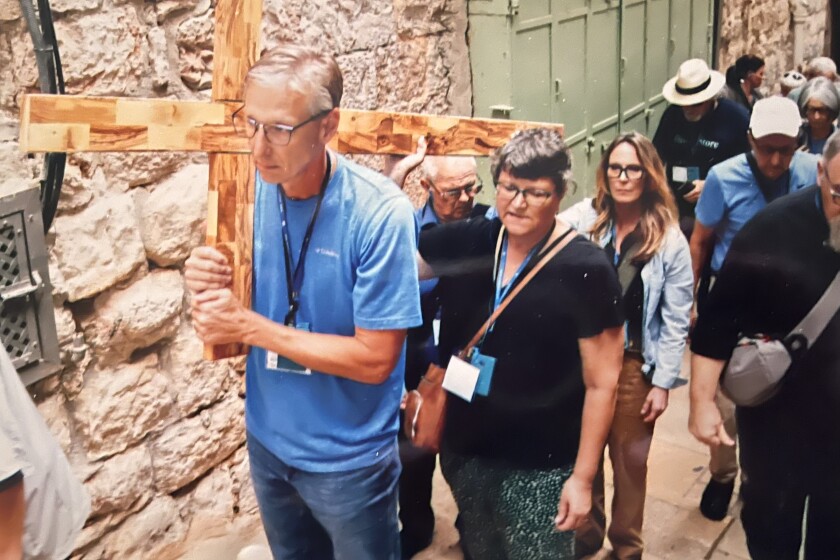
WEST FARGO — On Oct. 14, Shawn and Lori DeKeyser cheered happily from football stands in Moorhead for their daughter’s boyfriend and his Dragons team.
Melding into the crowd, no one would have suspected they’d returned from a war zone just days before, barely escaping a rapid escalation of tumult in the Middle East.
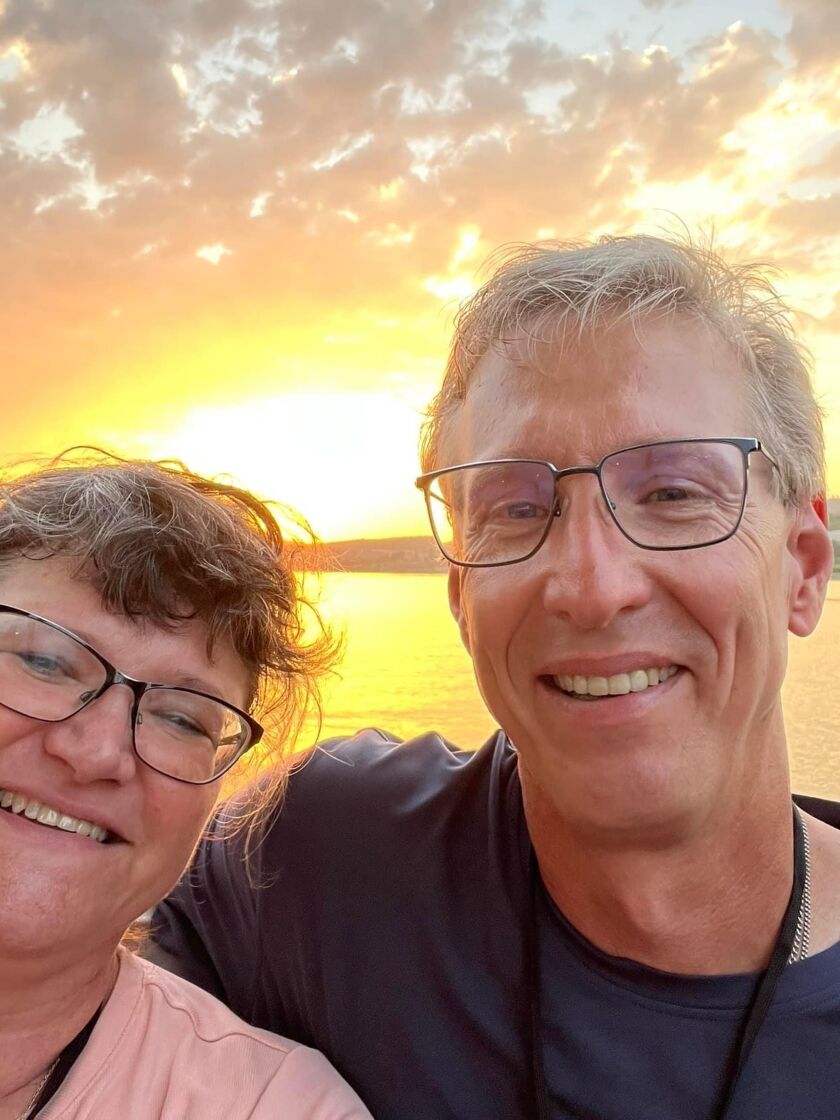
The couple, who’d joined 82 other pilgrims—the majority from their parish of Holy Cross Church—are still awakening to just how precarious the situation was.
“It was a pilgrimage and full of graces,” said Shawn, a deacon-in-training. “But I’m still trying to figure out everything we’re to learn from this.”
The trip had been on the couple’s bucket list for a while. “We decided that once our kids were out of the house, we were going to travel,” Lori said.
The adventure began as wonderfully as they’d anticipated, they said. But when, on Oct. 7, roads to their destinations, Jericho and the Dead Sea, were blocked, things changed.
“Before we left, we showed the kids where our will was, and all our financial documents (as a precaution),” Lori said. “But at one point it became a reality that we potentially could not come home.”
They’d also told their children, ages 19 to 28, not to call unless it was an emergency. “We wanted to just dive into the experience of the pilgrimage,” Lori said.
After four days of sightseeing at sites such as Cana and Capernaum, and experiencing a sunset boat cruise on the Sea of Galilee, the slim chance of danger became reality. “We were going to go visit the Jordan River where Jesus was baptized, and it was closed down,” Shawn said, “so, we turned around.”
“Everyone was on their phones at that point,” Lori added.
‘We had each other’
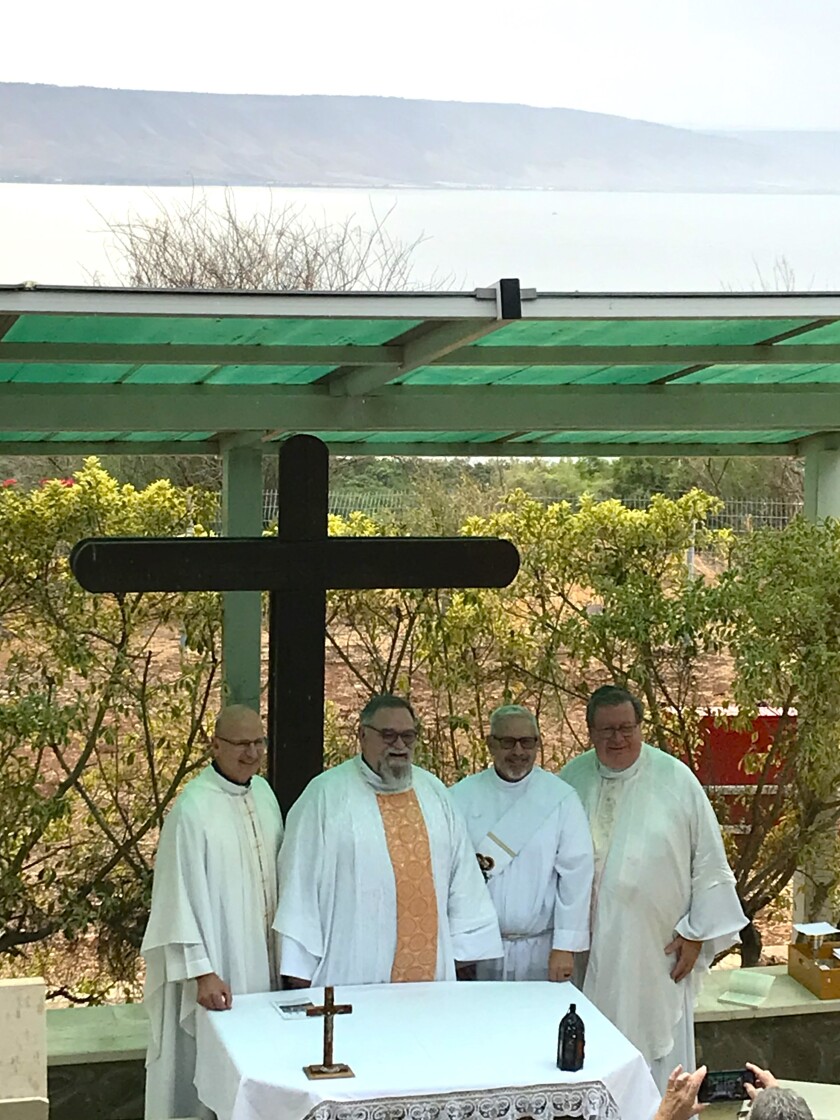
“When the declaration of war came, we were aware of that,” Shawn said. “But I felt safe the whole time and at peace. It was a pilgrimage, and whatever was happening was in God’s will.”
Not all felt as confident, they agreed, but being together helped, Lori said. “We definitely leaned on each other.”
This past Sunday, the trip’s blessings started becoming evident. Having just been to so many religious sites they’d read about before, but now could envision, Mass came to life in a new way. “It was like we were paying attention to every detail,” Shawn said, adding that the journey will be with them in positive ways for years to come.
Though neither regrets going, they are saddened by what they left behind. On the way to the border of Jordan, they dropped off their Christian Arab guide, a young father, at his in-laws’ home in Jerusalem.
“Watching him get off the bus was heart-wrenching, knowing what Christians there deal with daily,” Lori said, noting that Christians comprise only 1.4% of Israel’s population, and with tourism being a main income source, “He won’t be working now without government help.”
Conflicted from the start
Stacy Schwab was eager to travel to the Holy Land to see where Jesus had walked, but as the pilgrimage drew near, she began hearing of the area’s increasing volatility and grew concerned.
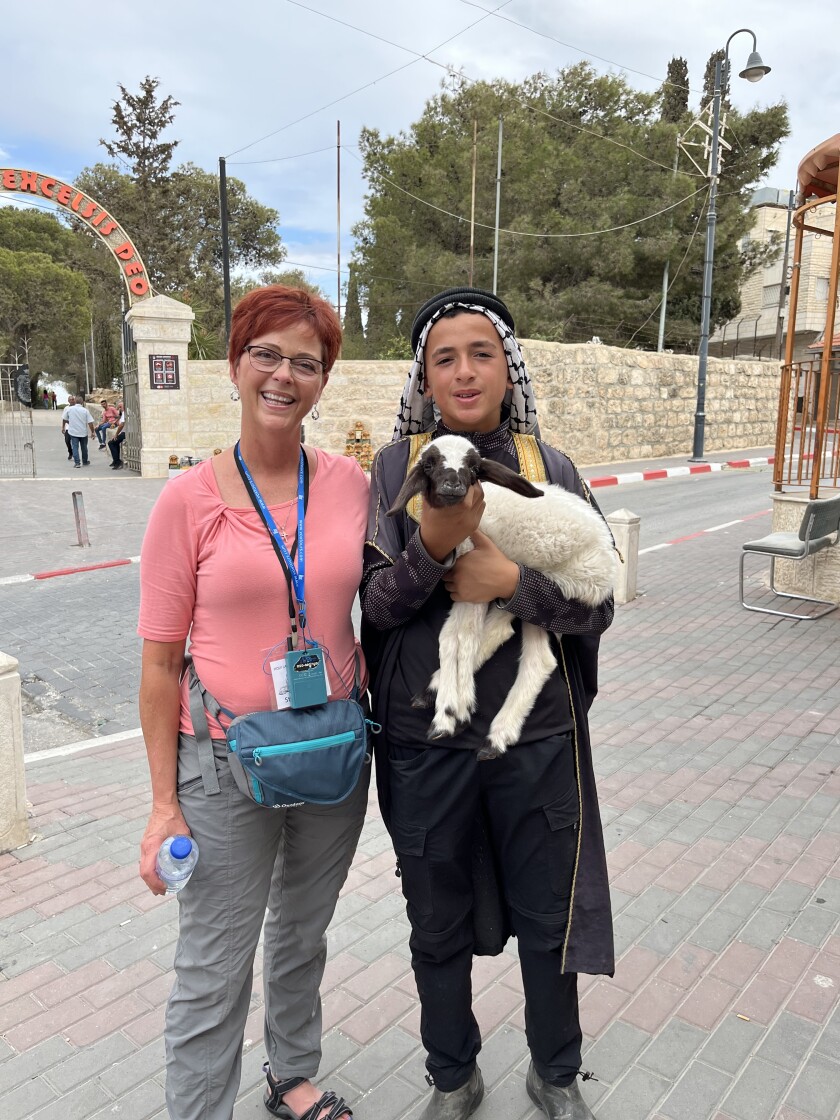
“What’s going on now did not surprise me,” she said. “I just was hoping and praying that it wouldn’t happen until after we got back, or not at all.”
Despite finding the tour deeply edifying spiritually, she said, on day four, her concerns heightened. Hearing gunshots and missile strikes, Schwab said, “I started to feel, ‘Okay, God, this isn’t funny. You have a bad sense of humor.”
Schwab’s brother, John McDonald, who works in emergency preparedness for the United States, also had begun sharing intel from contacts, including Mark Geist, who helped save 25 people in Benghazi, Libya, during the surprise attack against Americans in 2012.
“When he started messaging me throughout our day, which was nighttime for him, I knew it wasn’t going to end well,” Schwab said.
Worried about the group, McDonald also began tracking his sister’s movements through a phone app, and urged her to try convincing the group to find an alternate way home, avoiding Tel Aviv.
A change in tone
That same day, Schwab noticed a change in tone in the tour guides’ voices as they spoke in Arabic to one another. At one point, one made a motion. “All of a sudden he put his hands up, whistled and turned us around,” she said. “We quickly got on the bus.” On the way back to Bethlehem, the guide said nothing but “was tapping his foot and his body was rigid.”
“He’s worried,” Schwab’s friend, Melissa Perala, said, from their spot at the front of the bus. “And look how fast we’re going now.” They came upon large dirt piles dropped there as barricades, but finally made it back to safety, just before the roads closed.
Back at the hotel, Schwab shared information from her brother with the group’s leaders, but the plan was to continue onto Tel Aviv. She prayed God would intervene, she said. By morning, Canada Air had canceled all flights, forcing a reroute.
“By Monday, the only people left in our hotel were Americans,” Schwab said. Though given a chance to leave early with a group of three pilgrims, she declined. “My family begged me to go, but I felt I needed to be there; that God could use my brother and his contacts to keep us safe.”
Read more from faith writer Roxane B. Salonen
Since returning home, Schwab has been waking up frequently from nightmares of war, and she’s been worried about the guides, who became their friends, saying, “My heart is heavy for them.”
Despite Jesus’ opposition to war, she said, Jesus came to break through the violence on the earth and save everyone. “There’s good and there’s evil. We just have to pray for peace.”
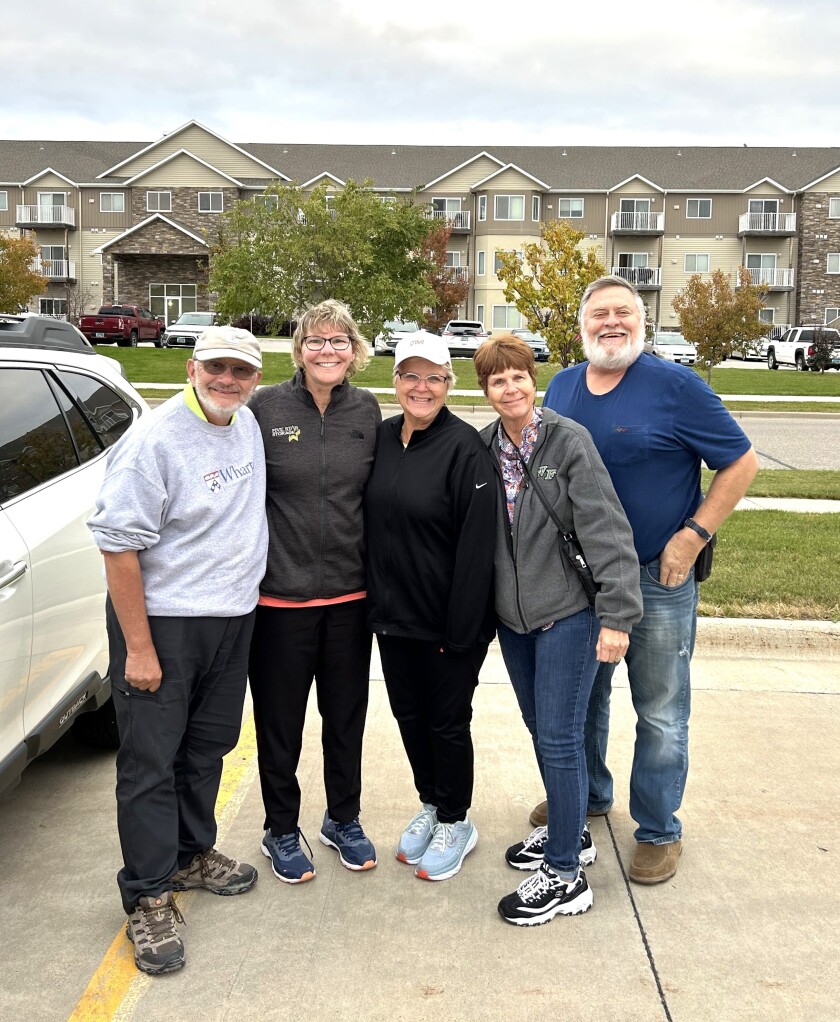
Last group out
When the last 21 of the pilgrims to leave the Middle East arrived at the Minneapolis airport on Saturday, Keith Murray was waiting. His wife, Barb, was among a group of four pilgrims he agreed to drive home.
Jennifer Halda was among them, too, and spoke to The Forum on speaker mode from Keith’s truck along the interstate, just off a 14-hour flight from Saudi Arabia to Chicago and 40 hours of total travel time—including layovers in airports.
“We’ve had times, to be honest, when it was a little stressful. At one point we weren’t sure if we would get tickets out,” Halda said. But they made the most of their extra days together, bonding and watching out for one another.
Her first real worry came when the normally-calm tour guide, said, “We gotta go now!” “My stomach was turning,” Halda said. “We could have been stuck for who knows how long.”
And while reaching the checkpoint to Jordan brought relief, the pilgrims began hearing from family begging them to come home. Halda said she knows the ordeal was especially hard on loved ones—her husband didn’t sleep for three days—but being able to communicate with them through modern technology helped.
“I tell you, with my heart full of gratitude, I’m so thankful for the thousands around the country who were praying for us,” she said. “You could really feel that sense of prayer.”
Helpless at home
Keith was among those feeling helpless watching reports of deaths and shootings on TV, and “realizing you couldn’t do a thing for them.” He finally told his wife, Barb, “You might as well keep your eyes open and take in everything you can, because you’re living through history.”
Once the decision to leave for Jordan was firm, the pilgrims were given 20 minutes to pack up and head out. “We had some older people who were traveling alone, so everyone pitched in,” Halda said. “We put in a buddy system, so we knew where everyone was.”
Just a couple hours after they left Bethlehem, she said, the routes behind them closed. “We got out just in time.”
Another pilgrim in the truck during the interview, Bridgette Starz, recalled lying in bed one night and listening to all the rockets blasting. “Those are things you can now put a sound to,” she said. “We don’t really experience that here in the States, the mortars and noise in the night.”
The next morning, words from Psalm 34 showed up in her readings: “I sought the Lord and he answered me; he delivered me from all my fears.” “I can’t tell you how many times I shared that with others,” she said. “That was the day we all got (airplane) tickets home.”
Though daily Mass was no longer an option, Barb said, praying the Rosary with a small group helped calm them. “Jesus was tapping me on the shoulder, saying, ‘Do not be afraid,’” she said. “We were on pilgrimage in the Holy Land, and in everything we did, God had our backs.”
Bumps at beginning, end
The Rev. Phil Ackerman, who led the group, and invited his twin sister, Phyllis Moen, from Arizona along, said pilgrimages always involve sacrifice, and the first bump came at the very beginning.
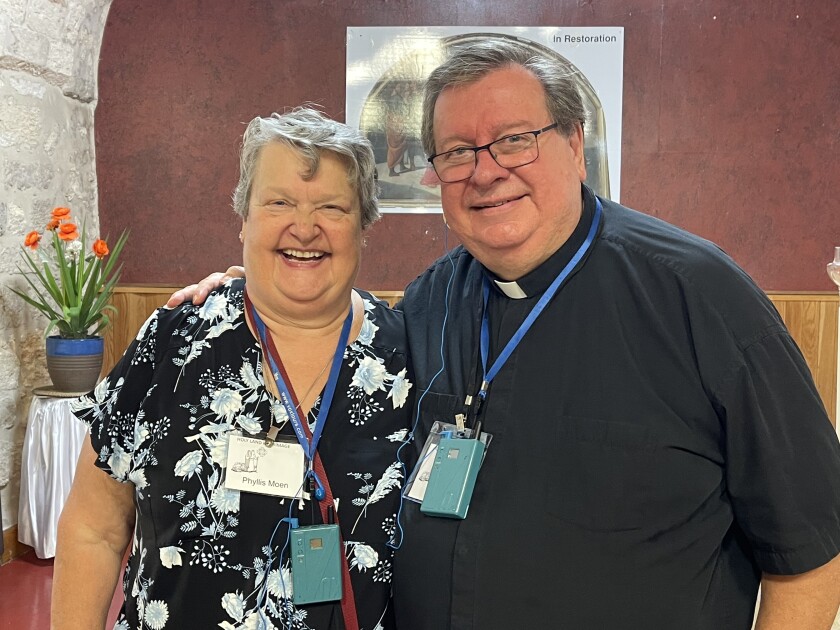
“Our flight had some delays,” he said, noting hydraulic-system issues with the plane. “So both the beginning and end had some challenges.”
That flight, containing about half the group, had to retreat and reboard, causing them to miss the first day. But the pilgrims met the challenges well. “We just felt that God’s hand was guiding us. We were being led by the Shepherd.”
As conflict around them rose, however, he thought of Joseph, Mary and their newborn, Jesus, fleeing to Egypt. “Of course, they had more hardships than we did.” Just like the holy family might have experienced, he said, an underlying anxiety developed as sounds of war increased.
On Saturday, noting long lines at gas pumps as people prepared for businesses to close, Ackerman’s mind went to a worst-case scenario of possibly being taken as hostages—with him being likely first in line.
“I kept thinking, well, Christ endured the cross and died for us, and maybe that’s what’s going to happen. Still, God is going to take care of us, even in that situation,” he said. “That was comforting to me personally.”
The experience heightened the pilgrims’ awareness of the region’s volatility, he said, and as they continue to process it, “It’s going to hit us in different ways.”
‘A real pilgrimage’
It was the second trip to the Holy Land for Rev. Gerard Braun of St. Anthony’s in Fargo, who last visited 13 years ago. “It was more of an internal experience this time,” he said, noting how he reflected upon holy sites more deeply, thinking, “Jesus might have played among these very rocks.”
Despite the tour’s pause, he said, he appreciated all they did do, including visiting the Milk Grotto, where it is said Mary nursed Jesus, and many couples struggling with infertility have visited since, praying for the blessing of children.
The fidelity and knowledge of the local guides also impressed him, he said, including one named Sam, who said, “God gave us one mouth and two ears, and that is what prayer is,” indicating it is listening more than speaking. “He spoke of faith and trust even in war.”
Echoing Ackerman’s words, Braun said this was “a real pilgrimage,” which always involves “putting yourself at the foot of the Cross” and expecting disrupted schedules and setbacks.
“We’re not meant to just be in control and safe in our little worlds,” he said, “but to be in Christ, and to allow him to use us as his instruments; as his servants.”
Halda said the pilgrimage was lifechanging, both spiritually and emotionally. “I never questioned my belief in God, but I feel a stronger bond (with God) now. I always felt protected and that he was going to get me through this.”
She added that no textbook could have prepared the pilgrim leaders how to best respond in such a crisis, but what matters most now? “We’re safe, we got home, and we’re okay.”
[For the sake of having a repository for my newspaper columns and articles, I reprint them here, with permission, a week after their run date. The preceding ran in The Forum newspaper on Oct. 20, 2023.]

Leave a Reply